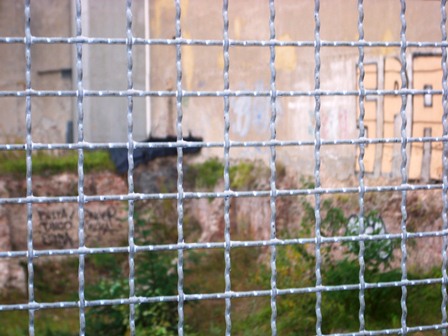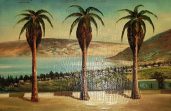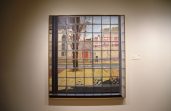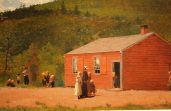December 2009
Merci
“Perhaps the most touching objects are simple stars cut out of paper and fabric from people with nothing more to give. . . ‘I am an old lady,’ explains one woman in a note with her star. ‘However, I send you a token of my appreciation… to thank you with all my heart for liberating us from this nightmare.’’’
http://www.phoenixmag.com/lifestyle/history/200908/merci-train/
One of the most memorable exhibits, I have ever seen, was at the Maine State Museum. After touring the museum, with its exhibits which focus on Maine history and her natural wonders, we happened upon several display cases bearing gifts from the citizens of France, to the citizens of America. The gifts were part of the Merci Train.
In 1947, as Europe sat in ruins, American journalist, Drew Pearson, suggested that American citizens send donations of food and clothing to war ravaged France and Italy. Americans generously responded to this call for help, contributing 40 million dollars worth of goods that were loaded onto what became known as the 700 boxcar Friendship Train. The train and its cargo was shipped to Europe, and distributed to those in need. Wanting to reciprocate, Andre Picard, a French railway worker, proposed that French citizen fill a boxcar in return, to thank Americans, for their kindness. The French ended up sending one boxcar per state, plus one to be shared by the District of Columbia and the Territory of Hawaii.
The gifts sent from France, included everything from handmade wedding dresses, to toys, porcelain, antiques, and art. Each offering was accompanied by hand written notes from the senders, expressing their gratitude not only for the gifts from the Friendship Train, but for America’s role in fighting both World War I and World War II. It was these notes which made the gifts and their exhibit sixty years later, so meaningful and memorable.
I recall standing in the museum, reading the notes and looking over all of the lovely things which were sent, and marveling at the human spirit. I will admit a proclivity for tea sets and embroidered linens, thus it is not surprising that I should be drawn to the items displayed, but it was the endless array of notes, translated for the benefit of the museum guest, which repeatedly brought me to tears. The notes were tender, personal, and genuine, expressing true gratitude from one nation of individuals to another.
This week, Americans will stop to observe one of our key national holidays, which despite some protest by those who claim that Thanksgiving, like Columbus Day, are actually about the destruction of Native American culture, most people celebrate Thanksgiving with glee – perhaps it is the traditional feast of roasted turkey, though deep fried turkey has made some inroads, sweet potatoes, mashed potatoes, stuffing, squash, vegetables, pies, rolls, and gallons of gravy.
There are various activities which accompany Thanksgiving Day dinner, besides a nice nap or the hope of a nice nap, after such a dinner. Some people will gather together to watch or participate in parades, marveling at the floats and critiquing the bands, others either sit and watch football, refereeing from the sidelines or actually toss the pigskin around themselves. For some, watching holiday movies, hanging up Christmas lights, or perhaps spending at least part of the day volunteering to help those less fortunate than they completes their Thanksgiving Day. In our family, dinner is usually followed by board games and of course endless hours of conversation. (This year things will be a bit different, as my Mother remains in the rehabilitation hospital, in Haverhill, Massachusetts, and thus we shall bring the celebration to her.)
At some point, during the day, there is usually a moment where the notion of being thankful comes into play or at least it should. Often, before dinner is served, people go around the table and everyone is given an opportunity to say what they are most grateful for, either before or after grace. Stopping to acknowledge our blessings, has for hundreds of years, been a central role in the concept of a Thanksgiving feast, whether we are celebrating the bounty of our harvest or a victory on the battle field or the simple fact that we are still here. Being thankful, and voicing our gratitude is cathartic, invigorating, and humbling.
It is quite natural to feel that the burdens which weigh on us are overwhelming and relentless. Regardless of what problems others might have, the tempest in our teapot is always the worst because it is our tempest. Intellectually, we may well be aware that there are others dealing with issues much worse than our own, but as anyone who has ever stubbed a toe or had a paper cut knows; our thirty seconds of agony can feel like a life time of pain. Likewise, in this age of entitlement, we often overlook all that we have and focus instead on the things which we believe we are missing out on or think we need.
Yet, reflection also brings to mind the many things which we have to be grateful for – our families and friends, our faith and strength, our health and well being, and our dreams and aspirations.
I am thankful that I am loved. I am thankful that my Mother’s health is improving; and I am thankful for a Mother who has prayed for her family all of her life. I am thankful that Caroline and Doug are doing such an outstanding job of taking care of my Mother. I am thankful for all of the people which have blessed my Mother with their prayers, cards, and good wishes. I am thankful that I was able to share Paris with Kate. I am thankful for Kate’s promotion. I am thankful for Kate’s kindness, mercy, and understanding, in more ways than I can ever innumerate. I am thankful that she has such excellent taste in jewelry. I am thankful that I got to see Kate play with Jack and Ryan. I am thankful that our family grew this year, when Allison married Nic. I am thankful for new relationships with extended family, that just a year ago were simply names in an address book. I am thankful for being reunited and for rekindling old friendships with so many truly amazing women. I am thankful for Nour looking at Kate and saying that we are family. I am thankful that Juan is walking again, recuperated from his fall. I am thankful that Doug survived his bout with MRSA, and look forward to his continued good health. I am thankful for all of the new people which have come into our life this year, and in the last few years which I look at and easily imagine sharing the rest of our life with. I am thankful that Marigold found us all. I am thankful that Jack is enjoying good health after dealing with Lyme disease this summer. I am thankful that our nation still stands. I am thankful that Melody’s home and family were spared this summer, from the fires in Los Angeles. I am thankful that Hannah preached her first sermon, and knocked it out of the ball park – a chip off of so many old blocks. I am thankful that I have sisters who have finally committed to visiting me, in my home!
I know that it has been a difficult year for many of us, and many of my own heartaches and loss have occupied these pages; but I also know that the very fact that we are still fighting the good fight is sufficient reason to at least pause and say I am thankful. A Happy Thanksgiving to you all. That is all for now.
~ M ~
November 2009
Taking Flight
“Old bureaucrat, my comrade, it is not you who are to blame. No one ever helped you to escape. You, like a termite, built your peace by blocking up with cement every chink and cranny through which the light might pierce. You rolled yourself up into a ball in your genteel security, in routine, in the stifling conventions of provincial life, raising a modest rampart against the winds and the tides and the stars. You have chosen not to be perturbed by great problems, having trouble enough to forget your own fate as man. You are not the dweller upon an errant planet and know not to ask yourself questions to which there are no answers. You are a petty bourgeois of Toulouse. Nobody grasped you by the shoulder while there was still time. Now the clay of which you were shaped has dried and hardened, and naught in you will ever awaken the sleeping musician, the poet, the astronomer that possibly inhabited you in the beginning.” ~ Antoine de Saint Exupèry ~
When I was a little girl, my mother had a yellow Pan American flight bag, which she had been given, on her first trip to Cuba. It was a square bag with a strap and zipper closing, which bore an airplane with the company logo. There was nothing particularly special about the bag, but it was one of my favorite play things. For me, the bag held enchanting possibilities and represented romantic adventures and far away exotic destinations yet to be discovered.
It was impossible that I should grow up to be anything other than a dreamer. My parents, for better or worse, made our childhood an adventure, and lived their lives seeking and creating the extraordinary – the ordinary was left to fend for itself. They exposed us to a life on the road, making sure that we stopped to see the sights; and that we absorb and observe other cultures through church, food, film, and of course books. My mother regularly took us to the library where we learned that if we could not fly off Petra, we could at least read about Petra.
There are many things which I love about the public library, not the least of which is the innumerable surprises which her shelves have provided me with, over the years. Most recently, it has been a copy of Antoine de Saint Exupèry’s, Wind, Sand and Star’s, which I purchased for a dollar, at a Friends of Library sale. I picked up the book, being familiar with Saint Exupèry’s The Little Prince, and because I liked the way this 1968 edition, of the 1939 classic, felt in my hands.
This memoir of sorts begins in 1926, with Saint Exupèry’s early experience as a pilot for Aéropostale, predecessor to Air France. Among other things, he writes of the delight and terror of learning to fly the postal routes of the Mediterranean and Sahara, as well as describing the men and machines which took to the skies, in the early days of modern aviation, and of surviving an accident in the desert. I am not sure what I expected to find in the bound pages; but I was greeted with poetry and philosophy, as well as romance and adventure, and a challenge to live life at a fuller and more vibrant level – regardless of the cost or consequences. This book shall not quickly leave my desk top or bedside table.
Today we were invited to witness a bit of history, and partake in the long honored tradition of gathering together to observe the majesty of flight; and the delightful bliss of a safe landing. As we drove to the airport, I thought Saint Exupèry’s observations and of the five individuals who on December 17, 1903, found themselves on a North Carolina beach, as Orville and Wilbur Wright, maneuvered the first power driven, heavier than air machine, ushering in the age of modern flight.
As the sun shown brightly, on a perfect Floridian day, Virgin American Airlines completed its maiden voyage to Fort Lauderdale, from both Los Angeles, and San Francisco. There was a palatable excitement, in the air and on the ground, as the press, special guest, and most importantly, employees of Virgin America gathered to await the flights. A tent was set up on the tarmac; and yes, there was festive music, an open bar, and an attractive wait staff that walked around with trays of appetizers and beverages. It was a joyful event. Undoubtedly, we were at a party! But the exhilaration displayed by the Virgin American staff seemed to be more than just the revelry of the moment; it was as if their spirits were lifted by the very knowledge that they were part of the magic which gives humanity the power to soar into the heavens and off to the unknown.
The first two flights arrived in tandem to much fanfare, including red carpets, water cannons, and dignitaries. The indomitable Sir Richard Branson, the business and marketing genius behind the Virgin brand, was of course the most illustrious of the luminaries who were present. He is not a man easily ignored in a crowd – literally glowing with his engaging smile and confident demeanor which seems to proclaim: I am not afraid. I believe in myself. I take chances. I dream. I break records. I conquer. I succeed, even if I fail – because I am always trying.
Standing in the normally restricted area of the airport, I imagine that Branson and Saint Exupèry might have easily been very good friends, with their shared passion for life; but I also thought of Brett, the new captain of the Virgin American operations, in Florida, whom I had only recently met. This fine young man, who has moved to Florida, from California, to begin his own adventure, is also one of those courageous and daring souls that as a mere teenager began to pilot planes. There is a breed of humanity who sees the world differently and who seeks to impact their life by imprinting it with the whole world, and not just the view from the front door.
It is not easy to take chances, to go where you have yet not gone or to even imagine that what you have never known is possible and should at least be attempted. It takes courage to spread your wings and literally fly. Bon Voyage Brett, I have do doubt that you will soar in your life; and soar you must. That is all for now.
~ M ~
November 2009
The Berlin Wall and Jelly Doughnuts
“As l looked out a moment ago from the Reichstag, that embodiment of German unity, I noticed words crudely spray-painted upon the wall, perhaps by a young Berliner, ‘This wall will fall. Beliefs become reality.’ Yes, across Europe, this wall will fall. For it cannot withstand faith; it cannot withstand truth. The wall cannot withstand freedom.” ~ President Ronald Regan ~
The first incarnation of the Berlin Wall, rows of barbed wire, was begun a month before I was born, in 1961. After months of discussions, between Soviet Premier Nikita Khrushchev and American President John Kennedy, where the two leaders danced around the issue, of finally resolving, what was to have been a temporary solution, to the German question, at the end of World War II. Germany had been divided into four sectors, as had the German capitol, Berlin, which was situated within the Soviet sector. For Germans wishing to escape to the west, crossing into West Berlin, was the quickest and easiest option. During the summer of 1961, more than 200,000 people had defected to the west, causing a great embarrassment to Khrushchev, a significant drain of resources in the east, and an economic hardship to the west, which had to address the needs of the new refugees.
With street lights darkened, after the city had gone to sleep, as August 13, arrived after the stroke of midnight, East Germany and the Soviets began to erect a wall which encased West Berlin. Much to the shock of the West Germans and I would imagine disappointment of East Germans, still hoping for change; President Kennedy’s response to what would become the Berlin Wall was impotent, according to Arthur M. Schlesinger, Jr., Special Assistant to President Kennedy. Kennedy ordered a military build-up in the United States, but made it clear he was not willing to go to war over the wall. (Arthur M. Schlesinger, Jr., A Thousand Days, Houghton Mifflin Company, Boston, 1965. Page 395) Some even believed he was relieved to be rid of the refugee problem, having told Walt Rostow, of the State Department, during a walk, at the White House Rose Garden, that he believed “Khrushchev would have to do something internally to re-establish control over the situation – and that, if he did, we would not be able to do a thing about it. Eastern Europe was a vital interest for Khrushchev, and could not stand by and let it trickle away. But it was not a vital interest for the United States.” (Ibid. Page 394) The consequences of Kennedy’s choice would be untold hardship and countless lost lives.
On November 9, 1989, the Berlin Wall finally fell. Actually, the wall was torn down, by sheer force of will. I remember outstretched hands reaching down to lift up strangers and friends, that they might take possession of what had once divided them and to the world symbolized what Winston Churchill called the iron curtain. It was on March 5, 1946, speaking at Westminster College, in Fulton, Missouri, that Churchill delivered a speech, Sinews of Peace where he said: “From Stettin in the Baltic to Trieste in the Adriatic an iron curtain has descended across the Continent. Behind that line lie all the capitals of the ancient states of Central and Eastern Europe. Warsaw, Berlin, Prague, Vienna, Budapest, Belgrade, Bucharest and Sofia, all these famous cities and the populations around them lie in what I must call the Soviet sphere, and all are subject in one form or another, not only to Soviet influence but to a very high and, in some cases, increasing measure of control from Moscow.” He, of course, could not then know that one day the curtain would spread across the Florida Straits, as well. http://www.historyguide.org/europe/churchill.html
I had lived my entire life in the shadow of those words; growing up in a home defined in no small part by the impact of communism, on Cuba, and by a Mother who constantly reminded us to pray for those behind the iron curtain. I well recall news broadcast which featured images of people trying to escape over the Berlin Wall, and the stories of those who were killed racing toward their freedom. Whether it was a wall or an ocean, it mattered little – the story was the same, ordinary people cramming themselves into a secret compartment, in a car, or lashing themselves to an inner tube, risking their lives for freedom.
I cannot honestly say that I ever imagined that I would visit Berlin or walk along the line which was once the boarder between freedom and oppression. I had not chosen to travel in Eastern Europe when I was younger, and had been afraid to go to Berlin. I much admired my friend Melody for going not only to Berlin, during her first trip to Europe, but for actually having the courage to cross over into East Berlin. This journey to Europe, took me not only to Berlin, but to a large swath of Eastern Europe.
I will admit though not afraid, I was certainly irritable in Berlin. In so many ways, it was not what I had expected. It was in no way the gay, colorful, vibrant city of say Cabaret, nor was it the staunch, rigid, fearful place pictured in books of the 1930’s and early 1940’s. Berlin was rather grey and chilly in mid-October, but it also felt terribly touristy and almost silly – especially in the areas around what is left of the Berlin Wall. I suppose I had expected that it would be more solemn. Walking in what had once been no man’s land, between east and west, where one could easily be shot, it was impossible not to wonder what it had all been about. What had it mattered where one stood or walked or lived? Why had people been killed for wanting simply to cross from one street to the next? Now I was one of the many tourist taking pictures where families had been divided, hearts broken, and blood shed.
Walking away from Check Point Charlie and what is left of the Berlin Wall, in somewhat of a haze, we passed the Holocaust Memorial, which is uneven rows of concrete stele’s which neither bear victims names nor any other reference information. To address this criticism, an underground information center was opened, which provides a historical context for the memorial. (The slabs are treated with an anti-graffiti material manufactured by the same German company, Degussa, which provided the Third Reich with the zyklon b used in the gas chambers.) We continued to the Brandenburg Gate, which was also jammed with tourist, and on to the Reichstag where Hitler once ruled Germany and tried to conquer the world.
Being in Berlin, it was impossible not to place every step into some historical context. President Regan’s demand that the Premier Mikhail Gorbachev open the Brandenburg Gate, and tear down the wall echoed in my ears; as did President Kennedy’s famous remarks that he too was a Berliner, though at the time, not all those in Berlin warmly received his remarks – many feeling that it was his lack of action which had left them surrounded by a concrete wall; and yes with some asserting that depending on the context of his German remarks, he could have been calling himself a jelly doughnut. http://history.howstuffworks.com/european-history/berlin-wall3.htm I also thought about Senator Obama’s speech in Germany, to cheering crowds and how many people had claimed that as his defining moment, as an up and coming world leader. President Obama had wanted to deliver his speech at the Brandenburg Gate, and was surprised when Chancellor Angela Merkel found it an odd idea for an American presidential candidate to want to campaign from the German landmark.
We did not stay long in Berlin, also rather unimpressed with the Jewish Museum, which seemed more intent on celebrating its home, a building designed to represent a deconstructed Star of David, than the history of Jews in Germany. I am glad we went to Berlin. I do think our trip demystified much of what I thought of Germany. There is much more to say on this subject, but at the moment, as Germany and so much of the world stop to mark the fall of the Berlin Wall, I am engaged in thoughts of contemporary German history. I, like many others, now find it odd that President Obama has chosen not to attend the ceremonies marking the twentieth anniversary of the fall of the Berlin Wall, which Chancellor Merkel did invite him to attend – apparently, the President of the free world does not have time to celebrate freedom? Is the United States President really too busy to mark this occasion? Can it truly be that a man who traveled more in ten months, than either of his predecessors, does not have time to mark the end of the Cold War?
I am also left wondering what awaits Cuba, when our Iron Curtain finally falls? One Castro has given way to another, and not much has changed. My father’s generation, which stood vigil over hoped change, is passing away and fewer of my generation, like President Obama, are taking up the cause of freedom and democracy. At the end, will it simply be capitalism which wins out? Did the Cold War come to an end, in Eastern Europe, because of failed economic policy; and is that what we can also look forward to in Cuba?
No one knows for certain how many East Germans died trying to cross the Berlin Wall, but the estimates are between one to two hundred people. One life lost would have been too many. Likewise, it is unknown how many Cubans have died in the Florida Straits; the conservative estimate is around 30,000 men, women, and children. I have no doubt that many of those who fled both places left searching for economic prosperity; but I do not believe that a better home or job is what propelled most to risk their lives. This week, we do not stop to celebrate a strong, united, German economic force; but rather to mark one of the beginnings of end of tyranny in Europe. I believe we should all make some time to celebrate the fall of this wall, and I urge you to also say at least a prayer, for the final fall of that curtain, which as President Regan said, cannot forever withstand faith, truth, and freedom.
That is all for now.











